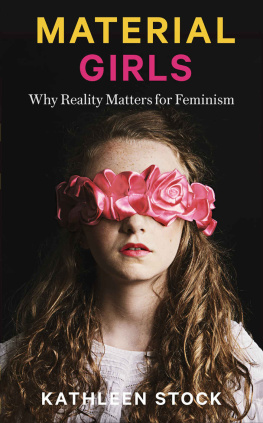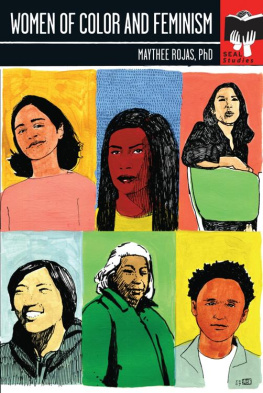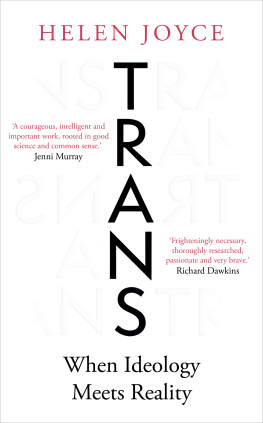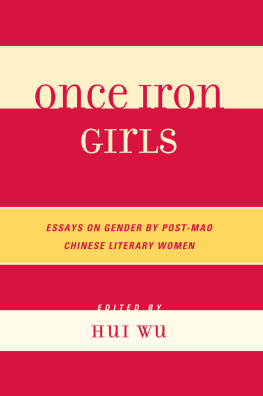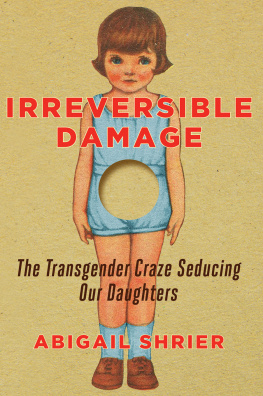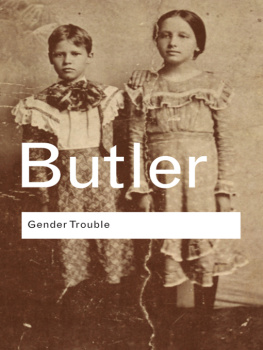Published by Fleet
ISBN: 978-0-349-72659-5
Copyright Kathleen Stock 2021
The moral right of the author has been asserted.
All rights reserved. No part of this publication may be reproduced, stored in a retrieval system, or transmitted, in any form or by any means, without the prior permission in writing of the publisher.
The publisher is not responsible for websites (or their content) that are not owned by the publisher.
Fleet
Little, Brown Book Group
Carmelite House
50 Victoria Embankment
London EC4Y 0DZ
www.littlebrown.co.uk
www.hachette.co.uk
To Laura
Contents
T his book is about sex, and about the mysterious thing known as gender. It is about how, in the first quarter of the twenty-first century quite unexpectedly a philosophical theory about something called gender identity gripped public consciousness, strongly influencing UK and international institutions, and causing protests and even violence.
In 2004, the UK government introduced a new law called the Gender Recognition Act. This allowed trans people to get a Gender Recognition Certificate, giving them what the official legal wording called an acquired gender in line with their preferences. In 2004, it was estimated there were about 2,0005,000 trans people in the UK.their natal one. In this way, they could protect themselves from accusations of fraud, and avoid being forced to disclose their sex in contexts where it might feel embarrassing or humiliating to do so. To get a Gender Recognition Certificate, applicants did not have to have undergone surgery or hormone treatment, but had to demonstrate they were serious about transition, having lived in their preferred gender for two years. They would also need official diagnosis of a profound and debilitating sense of unease about their sexed body, a psychological condition known as gender dysphoria.
Six years later, in 2010, gender reassignment was officially made a protected characteristic under the Equality Act. This made it illegal to discriminate against someone because of gender reassignment. To count as eligible for protection, a Gender Recognition Certificate was not officially required. Instead, a person was protected under the terms of the Act if they were proposing to undergo [were] undergoing or [had] undergone a process (or part of a process) for the purpose of reassigning the persons sex by changing physiological or other attributes of sex. In the Explanatory Notes, this rather opaque definition was further described as a situation where a person has proposed, started or completed a process to change his or her sex.
As I write this in 2020, sixteen years after the introduction of the Gender Recognition Act and ten years after the Equality Act, the situation on the ground has changed in several big respects. Most obviously, the number of trans people in the UK has rocketed. According to the LGBT charity Stonewall, their best estimate is about 600,000.
Along with this increase, there has been a radical change to
In 2011, doctors at GIDS started to administer drugs called puberty blockers to some patients at their clinic, in order to delay puberty and the physical changes it normally brings.)
Evidence shows that many young patients who receive puberty blockers later proceed to cross-sex hormones when they reach the age of majority, and sometimes to surgery too. But these days not everyone in the trans community medically transitions another way in which the 2004 stereotype of a trans person is now outdated. A 2019 study from the US notes that genital surgery has prevalence rates of about 2550% for transgender men [i.e. females] and 510% for transgender women [i.e. males].do not take hormones either. While medical practitioners often still think of being trans as a disorder, associating it with the condition of gender dysphoria and conceiving of it as something to be treated by drugs and surgery, many trans people now reject this idea, and with it the implication that any medical diagnosis or intervention is necessary for being trans.
As the size of the trans population has increased, its political voice has got stronger. Trans political interests are for the first time at the forefront of public consciousness. Prominent UK trans activist organisations such as Stonewall, Mermaids, the Scottish Trans Alliance, Gendered Intelligence, GIRES, Press For Change and All About Trans have made coordinated and effective pushes for a number of new measures, and have met with some success. Since 2015, as a direct result of lobbying, the main English and Scottish political parties have all supported proposed changes to the 2004 Gender Recognition Act that would make getting a Gender Recognition Certificate a matter of self-identification or self-ID, withdrawing the requirements of a medical diagnosis of gender dysphoria and of evidence of having lived in the acquired gender for two years beforehand. On the proposed new terms, getting a GRC, and so also changing ones birth certificate, would be a purely administrative and relatively instantaneous matter. The Conservatives, initially enthusiastic, have now rowed back on the proposal, but apparently the Labour, Liberal Democrat and Scottish National Parties all still officially support it, and it was included in each of their 2019 general election manifestos. Were Labour to get back into power, it is reasonable to assume they would seek to implement this change. As I write, the Women and Equalities Select Committee is again examining the question of gender recognition reform from an apparently sympathetic perspective.
The focused lobbying for gender recognition reform has That is, its an inner feeling. It is your gender identity rather than your sex that is considered to be what makes you man, woman or non-binary. It also determines your preferred pronouns: that is, whether you wish to be referred to as she, he or (in the case of non-binary people) they. Some supportive academics add that binary sex does not materially exist for humans in nature anyway. Educators in schools and universities are now advised by trans activist organisations to teach pupils and students about innate gender identity, and that sex is assigned at birth.
For at least five years, alongside proposed changes to the issuing of Gender Recognition Certificates, trans activist groups have been lobbying the Government to change the protected characteristic of gender reassignment in the Equality Act to gender identity. They have also pressed to have exemptions removed from the Equality Act that allow discrimination on the basis of sex in certain circumstances exemptions that might exclude trans people from single-sex spaces belonging to the opposite sex.instance, changing rooms, hostel dormitories, public toilets, sleeper carriages, school facilities, student accommodation, rape crisis centres and domestic violence refuges have been explicitly changed to include anyone, male or female, who self-identifies as a woman. Similar policies, citing self-identification as a man, now apply to many men-only facilities. There has also been a big rise in gender neutral facilities (in older terminology, unisex).
One striking consequence of this change is that since 2016, trans women some without GRCs have been housed alongside female inmates in the female prison estate. Also strikingly, in some amateur and professional sporting competitions, trans women now compete alongside females. Meanwhile, resources originally set up to try to establish equal opportunities for women in the workplace and public life for instance, all-women training and mentoring events, shortlists or prizes are now often explicitly open to anyone who identifies as a woman. Even in data collection, gender identity is replacing sex. For instance, despite protests from some academics and some hesitation over a similar plan in England, at the time of writing Census authorities in Scotland and Northern Ireland still plan to instruct respondents to their 2021 Census survey that they may answer the question about their sex as a question about their gender identity. By common consent of many powerful national bodies, it is gender identity that now determines what public spaces you may enter, what resources should be available to you, and how you should be categorised for the purposes of data collection.

